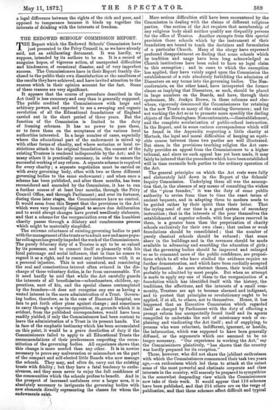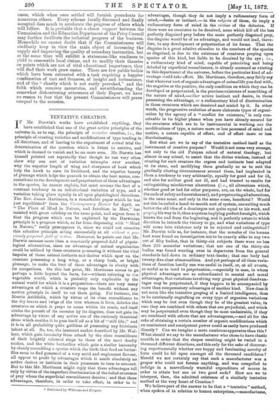THE ENDOWED SCHOOLS' COMMISSION REPORT.
THE Report which the Endowed Schools' Commission have just presented to the Privy Council is, as we have already said, not an exhilarating document. It was hardly, we suppose, intended by its authors to be so. It is a record of sanguine hopes, of vigorous action, of unexpected difficulties and hindrances, of occasional disaster, and of very imperfect success. The Commissioners have in their Report frankly dis- closed to the public their own dissatisfaction at the smallness of the results they have achieved, and have invited attention to the reasons which in their opinion account for the fact. Some of these reasons are very significant.
It appears that the course of procedure described in the Act itself is less summary and easy than is generally supposed. The public credited the Commissioners with large and arbitrary powers, and expected to see a sweeping and organic revolution of all the Educational foundations of England carried out in the short period of three years. But the function of the Commission is limited to the duty of framing schemes. It has no power to pass them, or to force them on the acceptance of the various local authorities interested. In a large number of cases, especially where the educational part of the endowment is mixed up with other forms of charity, and where sectarian or local re- strictions attach to the original foundation, the consent of the existing Trustees is rendered indispensable by the Act; and in many others it is practically necessary, in order to ensure the successful working of any reform. A separate scheme is required for every charity ; a separate negotiation must be carried on with every governing body, often with two or three different governing bodies to the same endowment ; and when once a scheme has been published, and after three months, has been reconsidered and amended by the Commission, it has to run a further course of at least four months, through the Privy Council Office, and through Parliament ; and over its fortunes, during these later stages, the Commissioners have no control. It would seem from this Report that the provisions in the Act which were very honestly designed to secure due deliberation and to avoid abrupt changes have proved needlessly elaborate, and that a scheme for the reorganization even of the humblest charity passes through a dilatory and cumbersome process which might be materially simplified.
The extreme reluctance of existing governing bodies to part with the management of the trusts or to admit new and more popu- lar colleagues has greatly impeded the work of the Commissioners. The purely fiduciary duty of a Trustee is apt to be so valued by its possessor, and to connect itself so pleasantly with his local patronage and social influence, that in time he comes to regard it as a right, and to resent any interference with it as a personal injustice. This is not unnatural, and considering the zeal and conscientious interest often evinced in the dis- charge of these voluntary duties, is far from unreasonable. Yet it need hardly be said that while the Act carefully guards the interests of all beneficiaries—schoolmasters, children, ap- prentices, next of kin, and the special classes contemplated by the founders—it does not recognise any one as having a vested interest in the mere administration of a Trust. Govern- ing bodies, therefore, as in the case of Emanuel Hospital, are fain to put forth other pleas against change ; and sometimes to carry through a vigorous opposition, on grounds which it is evident, from the published correspondence, would have been readily yielded, if only the Commissioners had been content to leave the administration of a Trust in its present hands. Yet in face of the emphatic testimony which has been accumulated on this point, it would be a grave dereliction of duty if the Commissioners failed to apply to all Educational Trusts the recommendations of their predecessors respecting the recon- f3titution of the governing bodies. All experience shows that
this change is more needed than any other. It is in nowise necessary to prove any malversation or misconduct on the part of the compact and self-elected little Boards who now manage the schools. They may, and often do, carry out the existing trusts with fidelity ; but they have a fatal tendency to exclu- siveness, and they seem never to enjoy the full confidence of the communities which the schools profess to benefit. And in the prospect of increased usefulness over a larger area, it is absolutely necessary to invigorate the governing bodies with new elements directly representing the classes for whom the endowments exist. More serious difficulties still have been encountered by the Commission in dealing with the claims of different religious parties. One section of the Act requires that membership of any religious body shall neither qualify nor disqualify persons for the office of Trustee. Another elempts from this special provision those schools which by the instrument of their foundation are bound to teach the doctrines and formularies of a particular Church. Many of the clergy have expressed profound disappointment on finding that some schools which by tradition and usage have been long acknowledged as Church institutions have been ruled to have no legal claim to this exemption ; and in cases to which the exemption has applied, they have vainly urged upon the Commission the establishment of a rule absolutely forbidding the admission of Dissenters on any terms into the governing bodies. The Non- conformists, on the other hand, have interpreted the former clause as implying that Dissenters, as such, should be placed in large numbers on the Boards, and have, through their spokesman, Mr. Jenkyn Brown, in these columns and else- where, vigorously denounced the Commissioners for retaining in the new Trusts so many of the existing Governors ; and for not working the Act so as to promote more speedily the darling objects of the Birmingham Nonconformists,--disestablishment, and the complete secularization of public-school instruction. In the Report, and in some curious correspondence which will be found in the Appendix respecting a little charity at Martock, the legal and moral difficulties of keeping an equit- able course betweed these two parties are well illustrated. But since, in the provisions touching religion the Act care- fully provides an appeal from the Commissioners to a higher tribunal, and since no such appeal has yet been made, it may fairly be inferred that the precedents which have been established will in time reconcile both parties to the ordinary operation of_ the Act.
The general principles on which the Act rests were fully and elaborately laid down in the Report of the Schools' Inquiry Commission. Underlying them all was the assump- tion that, in the absence of any means of consulting the wishes of the "pious founder," it was the duty of some public authority to revise from time to time the exact terms of ancient bequests, and in adapting them to modern needs to be guided rather by their spirit than their letter. That the crying need of our time is a good system of secondary instruction ; that in the interests of the poor themselves the establishment of superior schools, with free places reserved in them, is a greater boon than the perpetuation of charity schools exclusively for their own class ; that useless or weak foundations should be consolidated ; that the number of purely classical schools should be reduced ; that some share in the buildings and in the revenues should be made available in advancing and ennobling the education of girls ; that the governing bodies should be improved and enlarged so as to command more of the public confidence, are proposi- tions which to all who have studied the evidence require no further demonstration, and which have been cordially accepted by Parliament. As mere abstract theses, their truth would probably be admitted by most people. But when an attempt
is made to apply any one of them to the reorganization of a foundation which has identified itself with the history, the
traditions, the affections, and the interests of a small com- munity, Trustees are apt to become alarmed and indignant, and to protest that principles so revolutionary ought to be applied, if at all, to others, not to themselves. Hence, it has happened that an Executive Commission which regarded itself as charged by Parliament with the duty of effecting a prompt reform has unexpectedly found itself and its agents compelled to undertake the sort of missionary work of ex- plaining and vindicating the Act itself ; and of supplying, to persons who were reluctant, indifferent, ignorant, or hostile, the information, which was supposed to have been generally diffused, or the arguments which one assumed to be no longer necessary. "Our experience in working the Act," say the Commissioners plaintively, "has shown that the country was hardly prepared for its reception." Those, however, who did not share the jubilant enthusiasm with which the Commissioners commenced their task two years ago,—an enthusiasm which led them to attack at the outset some of the most powerful and obstinate corporate and class interests in the country, will scarcely be prepared to sympathize
in the somewhat desponding view which the Commissioners now take of their work. It would appear that 118 schemes have been published, and that 214 others are on the verge of publication, and that these schemes affect difficult and typical
cases, which when once settled will furnish precedents for numerous others. Every scheme locally discussed and finally accepted does much to accelerate the progress of others which will follow. It is probable that a closer rapport between the Commission and the Education Department of the Privy Council may further facilitate the technical progress of the business. Meanwhile we cannot doubt that if the Commissioners will stedfastly keep in view the main object of increasing the supply and improving the quality of secondary instruction, but at the same time will exhibit a statesman-like readiness to yield to reasonable local claims, and to modify their theories on points which are not of vital educational importance, they will find their work grow easier. There are few public bodies which have been entrusted with a task requiring a happier combination of tact and firmness, of insight and forbearance, and of the "charity which is not easily provoked," and the faith which removes mountains, and notwithstanding the somewhat disheartening utterances of their Report, we have no reason to fear that the present Commissioners will prove unequal to the occasion.



































 Previous page
Previous page